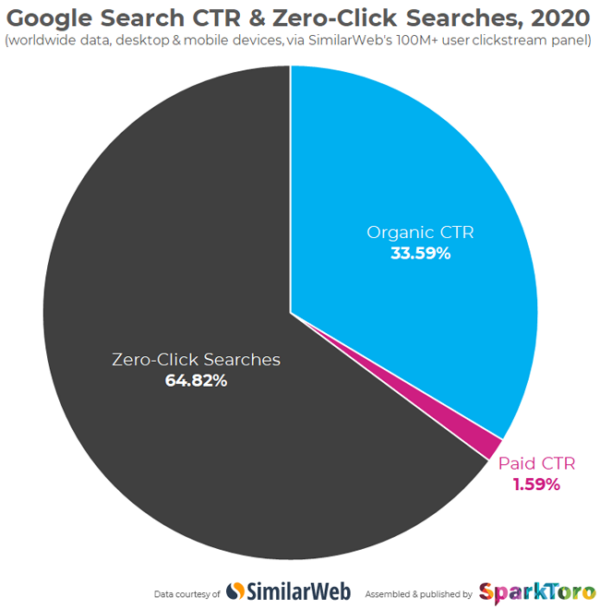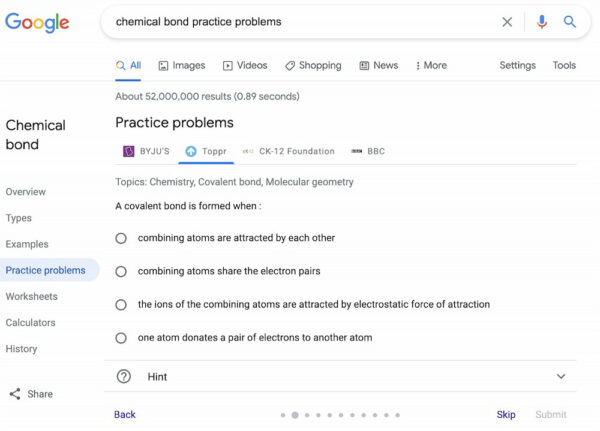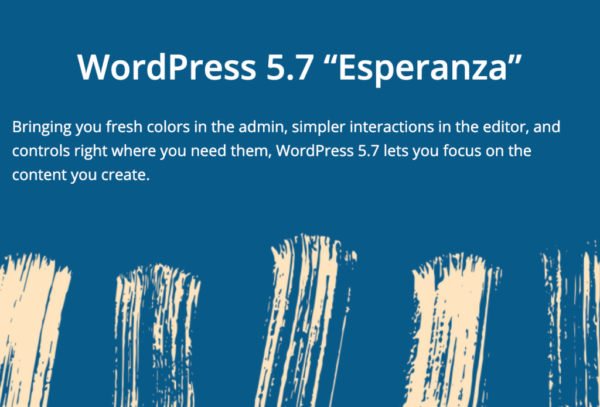SEO news in March 2021: A rise in Google’s zero-click searches

There was quite a bit of discussion about a study that said that nearly 65% of Google searches in 2020 did not result in a click. This is one of the topics that our resident SEO experts Joost de Valk and Jono Alderson talked about in this month’s webinar. Want to know what they had to say about this study and other SEO news this month? You can watch the March 2021 edition of our SEO news webinar or read all about the highlights right here. Enjoy!
Watch the March 2021 SEO news webinar
In this post, you can read all about the SEO news that Joost de Valk and Jono Alderson discussed during our latest SEO news webinar. If you’d rather (re)watch the webinar, you can find the video right here:
Google news
A study on Google’s zero-click searches, a few permanent changes due to the pandemic, new Schema markup and lots more! Read on to find out what Google has been up to the last few weeks.
Zero-click searches rose to nearly 65% last year

Let’s kick off with some news that caused some commotion in the last couple of weeks. Rand Fishkin published a study that says that nearly 65% of Google searches in 2020 did not result in a click. Now, this may sound like something to worry about, but it’s not. Think of it from a user’s perspective: when they’re looking for information about a meta description and see a featured snippet that explains what it is without having to click through, this is a perfect user experience. Having to click through and scroll down the page for an answer, is not. When your company name is in this featured snippet, and you’re giving users valuable information, this has a positive impact on your brand.
It’s understandable that you’re worried about your page visits, but focusing solely on getting clicks to hopefully make some money off of it isn’t the way to go. Keep in mind that Google’s objective isn’t to send traffic to your site. It’s to solve the problems of their users in the best way possible. The online landscape is changing and your business model needs to change with it. So instead of focusing on clicks, focus on finding ways to generate value for people that are searching for solutions in your field. This is harder, as it asks for a long-term and brand-oriented strategy, but it is the way forward. Not just when it comes to Google.
Good to know: Google has responded to this discussion and tells us that Google Search actually sends more traffic to the open web every year.
News publishers and Google’s search results
The elephant in the room is copyright, particularly when it comes to content published by newspapers or writers. Seeing the answer to your question in the search results is great for users, but it does ‘break’ the business model of sites that have content as their product. There are still a few unresolved questions. Perhaps we’ll see some legal pressure when it comes to these copyright issues, but that doesn’t change the main message. Adapt to these changes and think of the search results as a branding platform, not so much a place where you can harvest clicks.
Google predicts that a few pandemic changes are permanent

The pandemic has changed everything around us, and as a result, a lot of what we do has moved online. Google predicts that a few of these changes will be permanent. For one, events are now massively being held online. Of course, we’ll go back to in-person events when we have the chance. But you will probably see a number of events staying online. Or at least, offer the possibility to attend virtually. This past year has taught us that we don’t need to go to every event offline.
Another change that will probably stick around is working from home. A lot of businesses, Yoast included, will probably switch from working in the office (or at home) all the time to a more hybrid approach. An approach where people will be able to go to the office a few days a week and work from home when possible. For businesses that can do a lot of their work online, this pandemic has shown us that this a viable option.
Online shopping became the new normal
This past year, there has also been a rise in online shopping. It seems that online shopping has become the new normal for a lot of us. It’s also interesting to see that online queries around stock availability (questions like ‘who has X’ and ‘is X in stock’) increased by a whopping 8000%. These kinds of statistics are something to think about from an SEO perspective, as SEO revolves around positioning yourself as the solution that people are searching for at the moment. By keeping an eye on these kinds of developments, doing your keyword research, and following what tools Google is launching, you can play into these trends. Meaning that you can change your business model to stay relevant online and cater to the needs of your audience. Yes, it requires more work than tweaking your content, but it does help you build a future-proof brand.
Refreshed resources for video SEO
For a bit of technical news, Google added some refreshed resources for video SEO. Actually, they didn’t change a whole lot, but they did update their documentation on video SEO. What’s fun to see about that is that they made some changes in the order of importance when it comes to optimizing your videos for Search and Discover. It seems that providing structured data with VideoObject markup is now considered more important than submitting a video sitemap. Of course, submitting a sitemap remains important and very valuable. But this focus on Schema is something we’re very happy to see as Schema is so powerful in telling search engines what your content is about.
Google also has a great new feature when it comes to showing videos in the search results. You may have already seen an example in the search results of a highlighted clip that corresponds with what you’re looking for. There is some documentation on how to get your clips shown like this, but it doesn’t seem accessible for everyone just yet. In theory, you can mark up your videos in that way by using Schema but you still need to be ‘allowed’ by Google to get shown with a highlighted clip. Perhaps this is still a test, so we’ll keep an eye on where it goes.
If you use videos on your site and want to know more, our recent podcast on Video SEO can tell you all you need to know about this topic. Or check out our Video SEO for WordPress plugin that helps you drive traffic to videos on your website.
Google My Business releases tool to manage review
If you’re a local business that gets reviews online, you probably know that it’s always a pain to manage these reviews. When you get a spam review or bad review that you want to respond to, the process to do something about this review was always very difficult to get through. Now there’s a new interface in Google My Business that makes this a lot easier. It does only work for businesses with a small number of reviews or properties. In this new interface, you can see all your reviews in one place, work through them and check the status in one go. If you are a local business with a location that people visit, we would recommend having a look in Google My Business. And if you’re not sure what Google My Business is, we have a local SEO training course that can help you set this up!
New Schema markup for education sites
In other news, Google now supports new Schema markup for education sites. We’ve already seen lots of different examples of rich results powered by Schema, like FAQs and How-to’s that users can fold out and interact with in the search results. Or rich results for recipes with a calory count and image of the dish. This new markup is the next level. These can power results answering educational questions, the kind of thing you normally only see on a quiz or exam. This markup allows you to tell Google what the question is, whether it’s multiple choice, a time-based question, a formula, etc.

Google mentions that practice problems and math assistance are the most requested content from students since the pandemic. That’s why they are now supporting this Schema markup, to make it easier to find for students and other people that want to learn about this. This is a great example of content that a user would want the answer to in the search results, without having to click through. It’s a great example of why Schema is so important and how far we can still go with it.
SEOs worried for two weeks about their featured snippets
A lot of SEOs had a very stressful two weeks when a lot of featured snippets disappeared from the search results. Luckily, they eventually came back. Although it’s not quite clear why this happened, you shouldn’t worry too much when one of your featured snippets disappears for a while. The results change all the time and they’re shown differently to everyone.
Doing research into your rankings and the featured snippets that you’re getting is never wrong, but a change in this shouldn’t affect your day-to-day work. If you have a featured snippet one day and it’s gone the next, chances are that you’re still somewhere in the top search results and getting traffic to your site. So don’t change your strategy based on these details, but make sure to work on being the best result for multiple search queries. If your business depends on a top-ranking for one or two keywords, you are going to lose one of these rankings at some point and that makes you very vulnerable. Work on optimizing your site and pages for different keywords and practice holistic SEO to stay relevant in the long run.
Bing news
Microsoft Bing also has a bit of news that we want to share with you this month. Bing has been working on their image results, delivering a more visually immersive experience. As you can see from the image, this section now looks a lot more like Google’s image results. But what’s also very cool and innovative, is that you can actually click on a part of an image and say that you want to see more results similar to that part of the image. In addition, Bing is also using a lot of Schema to power the information that is provided with these images.
WordPress news
WordPress also has some fun news to share. There was a new release last month: WordPress 5.7. Not a huge release, but it does have some great features that will make using WordPress even easier.

Drag and drop blocks
First of all, this release introduces the drag and drop blocks. This means that you can now open the block listing when you’re working on a page and simply drag and drop the block of your choice to where you want to add it. It makes this editing process more fluent and allows you to easily interact with the content on your page.
A new color palette
Another addition is the new color palette. To give some background, there is still a lot of older coding in the WordPress admin area. A lot of that came down to the fact that there are a lot of different colors. And we do mean a lot. This resulted in the fact that every user that loads the WordPress interface was also loading all of these colors. Now there is a new, much simpler, palette, that’s really well thought out. You might have already seen the difference in shades in the backend. What’s cool is that all of these colors meet the recommended contrast ratio when placed against white or black.
A new Robots API
This release also comes with an addition that’s interesting for the plugin and theme developers out there. It comes with a new Robots API that makes it possible to manage the robots meta tag on a page. Essentially, this makes it easier for plugins and themes to be a bit more sophisticated in their understanding of whether a page should be noindexed or whether Google should be allowed to source a small or large image. If you want to learn more about this, check out our ultimate guide to robots.txt.
Yoast news
At Yoast, we also work on releasing new features and other interesting stuff every month. Last month, we celebrated our sweet sixteen!
Yoast SEO’s sweet sixteen
Our company isn’t 16 years old (yet), but we had our Yoast SEO 16.0 release in which we did something pretty major. We turned our Premium plugin into an addon instead of being a replacement for the free plugin. Why? Because this will make the update process a lot easier and in many ways more reliable. We’re also seeing that auto-updates are becoming more standard and this is also reflected in our users. We love seeing that trust from you guys and this switch to Premium as an addon will make the process more reliable. It also paves the way for some fun new things we want to add to our plugin in the very near future.
Our latest podcasts
We’ve recorded a few podcasts covering different topics in the last couple of weeks. If you want to know more about building a business in the online marketing world you may want to listen to our podcast starring Rand Fishkin. He talks about doing marketing without focusing on SEO, choosing which marketing trends to implement and who to target with your marketing message.
If you want to learn more about SEO copywriting, our podcast with Kate Toon can help you with that. She provides you with helpful tips to improve your writing skills and shares her view on what stands in the way of creating great content. This podcast will help you double-check and make the right changes to your texts.

Our most recent podcast is on improving your online video strategy and we had Phil Nottingham as an expert on this topic. If you want to dive deeper into the world of video, this is the podcast for you. During the podcast, Joost and Phil discuss best practices when it comes to videos, your video strategy and video SEO.
Page speed webinar: April 8th, 2021
We have another webinar coming up next week and this one is all about one topic: page speed. We get a lot of questions about page speed and how to optimize the speed of your page, so Jono Alderson will tell you all you need to know in this webinar! With the Core Web Vitals update coming this June, where Google is going to start treating site speed as a serious ranking factor, this is the perfect moment to get well acquainted with this topic. Make sure to register for this webinar that takes place at 8 pm CEST on April 8th, 2021!
That’s it for the SEO news in March 2021!
That’s it for now, but if you enjoyed watching (or reading about) this webinar, we hope to see you at our page speed webinar on the 8th of April, 2021. Or at the next edition of our monthly SEO news webinar on the 20th of April 2021. Want to receive a reminder for the next edition? Subscribe to our newsletter below and receive SEO tips and other news in the meantime. Hope to see you soon!
Read more: The latest news in SEO and WordPress: February 2021 »


Discussion (12)